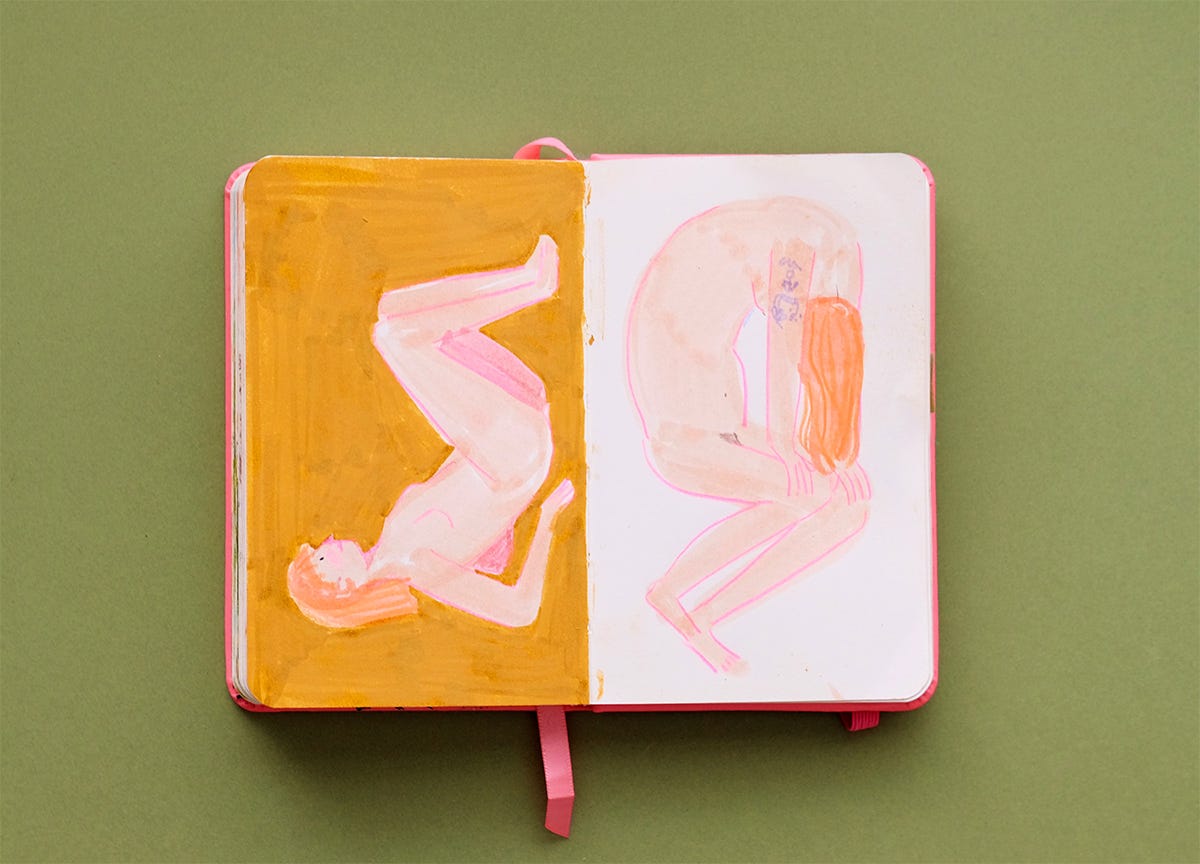Nobody told me 'burnout' doesn't mean 'burnout' in English
And I'm going to unplug completely for a few weeks (no wifi for me).
”I don’t think I will ever be like I was before.”
My friend Suze knew exactly what I meant, because she went through it as well.
”You’re not supposed too, because the way you were before was damaging you.”
I don’t even know how I managed to do all those things before.
I worked at least 12 hours a day and still had time to update social media and go out with friends.
Nowadays I’m running on a penlite battery instead of a agricultural generator that’s roaring 24/7.
Even with that smaller battery, I wrote a non-fiction book in the last couple of weeks. I’m about to send it to my publisher, and I’m very proud of what I wrote.
Next to that, I did my regular illustration jobs and that’s about all I was able to do. I skipped a monthly newsletter, didn’t post blogs and was slightly absent from social media. It was fine. No one died. And I don’t think anyone noticed.
I’m walking instead of running and even though it takes longer, I’m still getting where I need to be.
What is a burnout even?
What I learned from having a burnout is I have to reconcile with the fact I can’t treat my body and mind like they’re just vehicles to get where I want. They need attention and care, and most of all: I need to listen to them both.
What I also learned is that ‘burnout’ doesn’t mean what I know it to mean in the English language. That was a surprise! For months I thought some English-speaking friends were mocking my health, but the word just means something different there.
In Dutch and German we use the English word ‘burnout’ for a medical condition, which can only be diagnosed by a doctor. In those languages it means a breakdown with physical and mental implications. You can’t function normally and have to bed rest for a long period. For example, I couldn’t form sentences any more at one point, so I couldn’t really speak, nor could I read or write. I didn’t know whether I was standing up straight or hanging upside down (and nauseous all the time) because my vestibular system was affected.
Most people that suffer from burnout (in the Netherlands and Germany) aren’t able to work any more. A burnout can take anywhere from a few months to a few years.
To be honest, I didn’t do bed rest properly and I continued to work, eventhough it was a lot less. As a freelancer I was afraid to stop all sources of income. In hindsight I should have stopped working for a period of time, because after two years I’m still working to get better. It’s been so much better than last year though!
In native English-speaking countries, like the US, it once indicated something similar as to how Europeans use it, but it has transformed over the years into a more regular term to indicate someone is extremely tired. They don’t necessarily mean they’re sick. They might say after a busy or tough period, ‘I’m totally burnt out’.
For months I’ve been talking on this blog about “burnout” without realising it’s not necessarily the same in the English language.
Edit: I’ve learned after posting this that in English certain medical terms are more broadly used these days. People might say ‘I’m depressed/traumatised/burnt out’ when they haven’t got a medical diagnosis but to exaggerate/emphasize their feelings. That explains so much!
So, there you go! Never assume an English word in your language means the same thing in the actual English language.
Time to unplug completely
Now that my book is written and my publisher needs time to read and approve it (before I can illustrate it), I’m going to take some time off.
I did a semi-sabbatical last year, where I worked about 4-6 hours a day and took the rest of the day off. It was a nice time but I learned that even when you work a couple of hours a day, your brain will still be ‘on’ the whole day. You can’t just switch it off when you still use it on a daily basis.
So, this year I’m going to unplug completely. I’m turning off my phone and I won’t be using the internet. At least, that’s the plan. As a recovering workaholic it’s going to be a challenge, but I think it’ll be worth it. I need time to shut out external voices and listen to myself again, and to that I’m really looking forward.
Do let me know what your Summer plans involve.
Wishing you wonderful Summer days and speak soon!








This is wild. Not more than a day ago the words "How did I find the energy to do all of it?" preceded a list of the eight million things I used to crush through in a day. Now - more often than not - I can barely get through the basics. As a fellow recovering workaholic, I hope you're off galloping through lush pastures, or just laying in them and watching the clouds.
Hi Marloes,
As for burn-out I experienced the same, very frustrating until you know.
I also noticed in Dutch it's used as a superlative to being 'overspannen'!
So burn-out is worse than being overspannen 🙃
Enjoy your time off! ♡